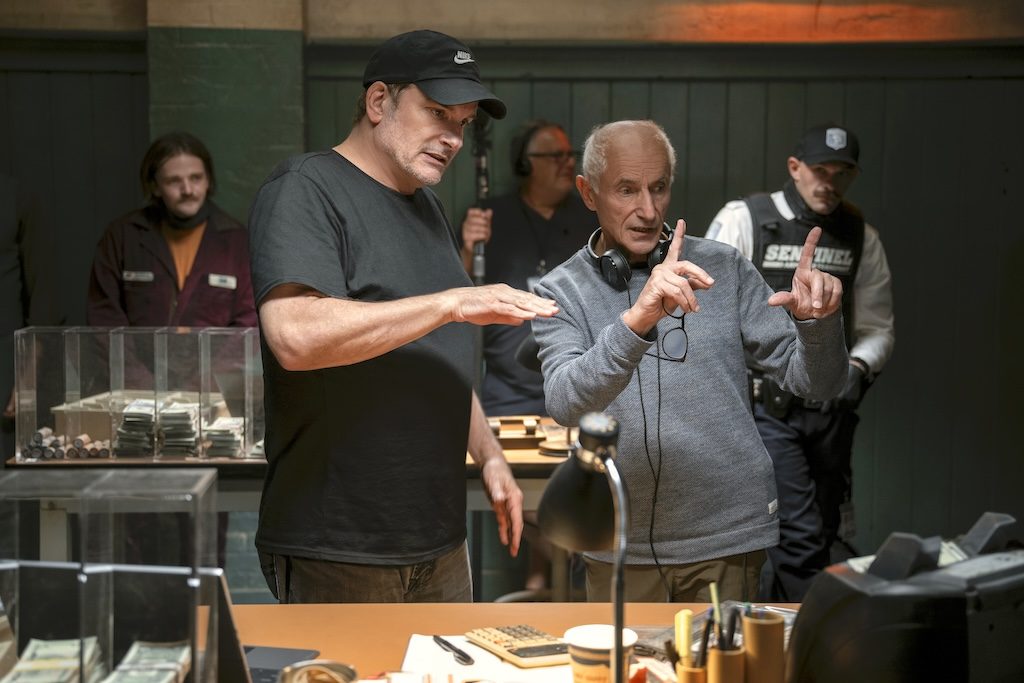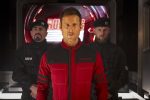Play Dirty: Inside Shane Black’s Heist of Grit, Wit, and Hit

When it comes to modern action cinema, Shane Black’s fingerprints are unmistakable — sharp and witty dialogue, kinetic storytelling, and a knack for blending off-the-cuff humor with hard-hitting drama and character work. Since exploding onto the scene with his action script for Lethal Weapon (1987), Black has shaped the genre with his unique brand of banter, blood and bruises. He followed that groundbreaking success with a string of notable screenwriting credits, including The Last Boy Scout, The Long Kiss Goodnight, and Kiss Kiss Bang Bang (which also marked his directorial debut).
Then, in 2013, he directed the global blockbuster Iron Man 3, cementing his reputation as a filmmaker who can juggle spectacle, character, and wit on the biggest stage.
Now, with Play Dirty, Black turns his attention to the legendary Parker crime novels by Richard Stark (using the pseudonym Donald Westlake), assembling a dream team of collaborators to bring this iconic antihero to the screen. Stark was described by critics as the “mad jester of the mystery world.” The novels were generally darker and grittier than the the film, but Play Dirty retain the wry humor of Parker from them. Parker’s world is full of hypocrites, weirdos and losers and the film escalates their eccentricities and idiosyncrasies.
Notably, Play Dirty was the original title for Black’s screenplay for Lethal Weapon 2 which Shane considers to have a much darker tone than its predecessor.
In this interview with Creative Screenwriting Magazine, Black opens up about the unique challenges of adapting hardboiled fiction, the power of creative partnerships, and why grounding spectacle wrapped in emotion is the secret weapon of any great script.

Director Shane Black (left), Cinematographer Philippe Rousselot (right) Photo by Jasin Boland/Prime © Amazon Content Services LLC
Balancing Spectacle and Substance
No matter how large the budget or how bombastic the action sequence in the film, every moment in Play Dirty had to serve something deeper and more meaningful than spectacle. Black insists that emotional stakes are what set great action apart.
“It’s absolutely essential to follow the one precept: to stay on top, you remember to touch bottom,” Black says. “You have to center it in something that’s very palpable, very real. Make the movie about something — otherwise all the spectacle in the world isn’t going to save you.”
For Black, the temptation in Hollywood is always to go bigger and bolder, but size with bombsat means nothing without substance. “Once you have a justification for a big action scene — something that reveals character or adds to the theme — then you can plan the specifics. That’s where pre-production is critical. You can storyboard, animate, even make a mini-movie of the action before you shoot a single frame. But it all has to flow from the story.”
This philosophy echoes throughout Black’s filmography. Lethal Weapon gave us not just wild shootouts, but the wounded camaraderie of Martin Riggs (Mel Gibson) and Roger Murtaugh (Danny Glover). Iron Man 3 wasn’t just about exploding suits — it was about Tony Stark (Robert Downey Junior) facing his own vulnerability.

Zen (Rosa Salazar) Photo by Jasin Boland/ Prime © Amazon Content Services LLC
The Essence of Parker: Blue-Collar Antihero
Play Dirty’s protagonist, Parker (Mark Wahlberg), isn’t your typical action hero. He’s a professional thief with an amoral code — a man who’s neither villain nor savior. He’s a straight and serious man who doesn’t crack jokes.
“He has a very pragmatic, egoless way of thinking. He’s not trying to be a hero or flashy; he doesn’t care what people think of him. There’s a tremendous liberation to that — he just does the job.”
Parker is a blue-collar James Bond, an old-school craftsman up against the syndicate’s corporate machine. “There’s a Western quality to him,” Black adds. “He’s the trailblazer who doesn’t have the same resources as everyone, but he’s just a working guy. Loyalty, friendship, psychology, and grit — those are his tools,” Black asserts.
That moral code is as much about boundaries as it is about loyalty. “He’s a criminal, not a good man, but he does things a certain way. There are things he’ll tolerate and things he won’t. He doesn’t have friends, but has loyalties. He’s a total professional, and that’s what’s drawn people to these books over the years.” He plans every heist to the last detail and thinks on his feet for alternatives when plans invariably go awry.

Grofield (LaKeith Stanfield) Photo by Jasin Boland/ Prime © Amazon Content Services LLC
Adapting a Literary Legacy: Choosing Where to Begin
Tackling the Parker novels meant wading through a mountain of source material — over two dozen books by Richard Stark. For Black, that was a challenge to savor.
“This is one of those rare instances where they’re paying me to do something I would have done anyway. I’d already read most of the books before we started writing. I went back, started from number one, and reread them all, to reacquaint myself with them” he recalls with glee.
Rather than rehash Parker’s origin story in Play Dirty — already adapted in films like Point Blank and Payback — Black and his team wanted to drop the audience midstream into the action where he had already been betrayed and took on The Outfit.“Everyone’s done the first novel [The Hunter, which became Point Blank, starring Lee Marvin] to death. We decided to pick up with Parker as an established pro, referencing past betrayals as his backstory. The idea was to do what the new Superman movies did: skip the origin, and let him already be in his world.”
The adaptation process required tough choices about what to keep and what to leave behind. “The trick with adapting material like this is not to be slavish, but to be respectful,” Black advises. “You want fans of the books to recognize the character, but the movie also has to stand on its own two feet.”
The Writers’ Roundtable: Collaboration in Action
For Black, Play Dirty’s script took shape through true collaboration with his co-writers Anthony Bagarozzi and Charles Mondry which he has known since high school. “It was one of the most rewarding experiences of my career. From the beginning, there was so much energy around the table. We’d meet at someone’s house, coffee brewing, books spread out. There wasn’t one person doing a first pass — it was all of us, bouncing ideas, challenging each other, interrogating what made these stories tick.”
Each writer brought a unique skillset to the table. Black handled the big picture aspects — structure, tone, and the emotional arcs. Anthony was the consummate problem solver, never panicking, always ready to tackle an impossible challenge. Charles contributed razor-sharp wit, class, and sophisticated dialogue. “There’s a real sense of creative play, but also mutual respect. If someone gets stuck, the others are there to help out.”
This three-way partnership is our attempt to generate a trailer in our heads and then make sure the movie lives up to that promise – Shane Black
The goal was to capture the lean, unsentimental spirit of the books — darkly humorous, morally ambiguous, and always in motion. “We spent as much time debating what to leave out as what to put in — paring things down to essentials, making sure every scene moved the story and revealed character.”

Parker (Mark Wahlberg) Photo by Jasin Boland/ Prime © Amazon Content Services LLC
Creative Friction: The Secret Ingredient
This creative friction, Black asserts, was the engine behind the film’s edge. “There’s a myth that collaboration is always harmonious, but you have to be willing to argue for the best idea. We’d have long debates about a single line or beat, especially if it felt like we were drifting from the tone of the books. Sometimes it got heated, but it was always in service of the story.”
One stretch saw the team spend days on a single sequence — writing, reading aloud, tearing it apart, starting over. “It was exhausting, but exhilarating. That’s when you know you’re onto something good: when everyone’s fighting for what makes the story sing.”
Black is proud of how the team balanced honoring Richard Stark’s minimalist style with their own creative voice. “At the end of a long day, we’d realize we were all chasing the same thing: clarity, economy, and relentless drive — the same qualities that make Parker compelling.”
Beyond the Script: Directing with a Writer’s Eye
Black’s background as a screenwriter deeply informs his approach on set. “I can’t separate writing from directing — they’re both about rhythm and surprise. On set, I want actors to feel the same sense of play that we had in the writers’ room. Some of the best moments come from improvisation, or a last-minute rewrite that sharpens a line or flips a scene on its head.”
He points to Iron Man 3 as an example. “We had this massive budget, but I kept reminding myself: If Tony Stark’s not interesting, no action scene will save us. That’s true of Parker too. You have to believe in the man before you care about the mayhem.”
Join the Discussion!
Related Articles
Browse our Videos for Sale
[woocommerce_products_carousel_all_in_one template="compact.css" all_items="88" show_only="id" products="" ordering="random" categories="115" tags="" show_title="false" show_description="false" allow_shortcodes="false" show_price="false" show_category="false" show_tags="false" show_add_to_cart_button="false" show_more_button="false" show_more_items_button="false" show_featured_image="true" image_source="thumbnail" image_height="100" image_width="100" items_to_show_mobiles="3" items_to_show_tablets="6" items_to_show="6" slide_by="1" margin="0" loop="true" stop_on_hover="true" auto_play="true" auto_play_timeout="1200" auto_play_speed="1600" nav="false" nav_speed="800" dots="false" dots_speed="800" lazy_load="false" mouse_drag="true" mouse_wheel="true" touch_drag="true" easing="linear" auto_height="true"]










You must be logged in to post a comment Login